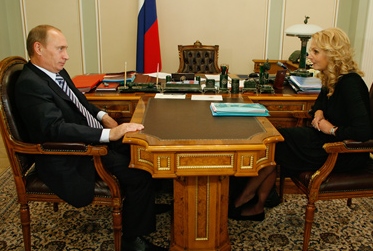
Russian Official Proposes Cutting Financial Aid to the North Caucasus
Russian Official Proposes Cutting Financial Aid to the North Caucasus
On July 10, Tatyana Golikova, chairperson of the Audit Chamber, Russia’s independent state budgetary watchdog agency, spoke about the country’s highly subsidized regions at a government meeting in Moscow. The Audit Chamber reviewed budget execution in seven highly subsidized regions to determine how well such regions comply with the requirements of the Finance Ministry aimed at increasing the effectiveness of how budget funds are used. Regions especially dependent on financial infusions from Moscow are subject to special reporting requirements to ensure greater central government oversight (audit.gov.ru, July 10).
According to Golikova’s definition, highly subsided regions included those that received subsidies exceeding 60 percent of their income. She clarified that on average financial transfers from Moscow account for 75 percent or more of the budgets of the regions in question. Overall, the government spent an estimated $8 billion to help these regions, which include the Republic of Altai, Tyva, Dagestan, Ingushetia, Chechnya, Karachaevo-Cherkessia and Kamchatsky Krai. Four out of seven of the highly subsidized regions are in the North Caucasus; the other three are remote areas in Siberia and the Far East. Golikova stated that the seven regions under review did not comply with the government requirements: “A significant number of indicators that are described in these agreements [between the central government] and the regions are either not carried out or are not carried out in a timely fashion.” Summing up, she said the Ministry of Finance has largely failed to react to the regions’ mismanagement because it lacked the legal mechanisms for responding to non-compliance and out of fear of financial collapse in such regions. “Maybe, we should not suspend the entire package of financial aid, but restrict it to a certain share until the conditions are met that they themselves [the regions] have agreed to,” Golikova said (audit.gov.ru, July 10).
These comments from one of the Russian government’s most important financial figures is the latest instance of Moscow’s grumbling about the financial burden that some regions have become for the central government’s budget. This mainly concerns the North Caucasian republics. Even though the Russian official cited only Dagestan, Chechnya, Ingushetia and Karachaevo-Cherkessia in the North Caucasus, the region’s three other republics—Adygea, Kabardino-Balkaria and North Ossetia—also have about 60 percent of their incomes provided by financial aid from Moscow. As the awareness of the economic downturn spreads across the country’s political class, the Russian government is trying to locate the least efficient areas and amend them.
Financial aid to the North Caucasus might be seen by some people in Moscow as the most appropriate and the least risky budget item to cut back upon. It would certainly be received well by ethnic Russians, who complain about the government’s lavish spending on the North Caucasus while some majority-ethnic-Russian territories badly need investment. However, the nature of relations between Moscow and the North Caucasian republics precludes the central government from making decisions based purely on economic logic. While ethnic Russian regions deep inside the Russian Federation have no separatist inclinations, the North Caucasian republics have harbored separatist sentiment for a long time. So, Moscow is prepared to subsidize the North Caucasians at the expense of ethnic Russian regions.
Given President Vladimir Putin’s gamble in Ukraine, there is little doubt that Russia’s appetite for imperial conquest has been satisfied. At the same time, economic pressures have started affecting the government’s policies more explicitly and will continue to do so. Direct financial aid to the North Caucasus is only part of the problem; there are other types of aid that are not reflected in budget relations. For example, electricity for businesses in the North Caucasus is subsidized at 50 percent of its national market price. The only other region of the Russian Federation that has subsidies for electricity for companies is, again, Tyva in southern Siberia. The plan was to transition to market prices in the North Caucasus by January 1, 2015; now, however, the Russian government agency Rosseti says that liberalization should be postponed until 2025 because the shock would be too painful for the North Caucasian republics (kavpolit.com, July 31).
The rare voices among Russian experts, who call on the government to start finally talking to people in the North Caucasus and ask them how they want to build their lives, receive little attention from the Russian government. “No carefully crafted economic plan that takes into account all the external competition, political dynamics and everything else will work in the North Caucasian regions until there are conditions for the resolution of internal conflicts,” the well-known Russian expert on the North Caucasus, Igor Kazenin, wrote. “The primary condition is a dialogue on issues […] that would engage the real leaders and be received well by the government” (kavpolit.com, July 11).
It is easy to discern in Kazenin’s words a political statement that the North Caucasus lacks democracy, which makes economic reforms in the region virtually impossible. Paradoxically, if Moscow is more cash-starved, it may be forced to listen to those who argue in favor of giving power to the people because the government can no longer honor its paternalistic promises.


